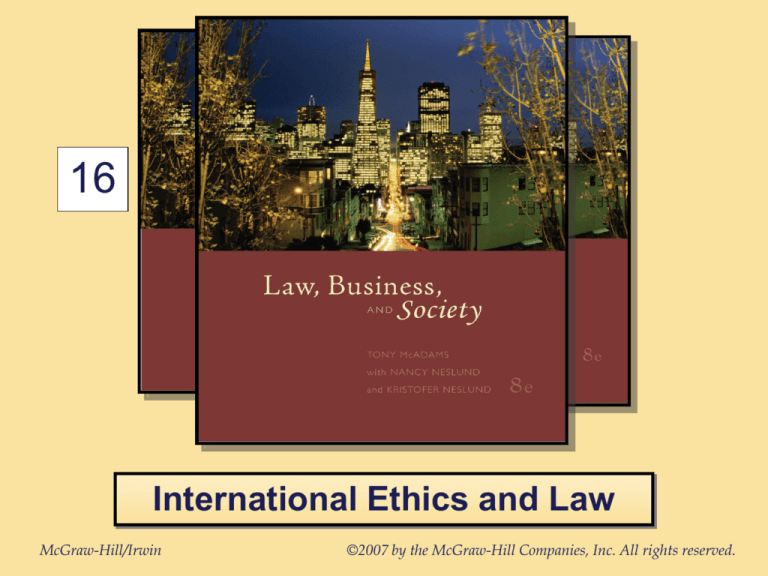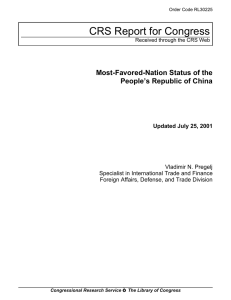
16
International Ethics and Law
McGraw-Hill/Irwin
©2007 by the McGraw-Hill Companies, Inc. All rights reserved.
Chapter
16
International Ethics
and Law
Key Points
• Pervasiveness of globalization and its
contributions and challenges
• Social responsibility in a global context
• International law foundations, illustrations
and dispute resolution mechanisms
WTO Basics
149 member nations, from every continent, from communist to
socialist to capitalist
Saudi Arabia became the newest WTO country on December
11, 2005
Fundamental principle subscribed to by all members nations:
“[T]he substantial reduction of tariffs and other barriers to
trade” will contribute to the objectives of “raising
standards of living, ensuring full employment and a large
and steadily growing volume of real income.
Source: Preamble, Agreement Establishing the World Trade Organizations
Global Capitalism: Can It Be Made
To Work Better?
• “The overwhelming conclusion … is that there are many examples of
where reckless investment has done harm—but there is no case
where the hazards can’t be addressed with better government
and corporate policy.”
• “The downside of global capitalism is the disruption of whole societies.”
• “A more realistic view is now gaining hold. It begins with a similar
premise: that trade and inflows of private capital are still
essential to achieving strong sustainable growth and to reducing
poverty. But it acknowledges the multinationals—which account f
or the bulk of direct responsibilities in nations where the rule of
law is weak.”
• “According to the new pragmatism, governments first must deliver
political stability, sound economic management, and educated
worker if they are to gain from wide-open markets.”
Source: Business Week, November 6, 2002, pp. 72-75.
Islamic Law: Myths And
Realities—Part I
• “In order to protect the five important indispensables in Islam
(religion, life, intellect, offspring and property), Islamic Law
has provided a worldly punishment in addition to that in the
hereafter. Islam has, in fact, adopted two courses for the
preservation of these five indispensables: the first is through
cultivating religious consciousness in the human soul and the
awakening of human awareness through moral education;
the second is by inflicting deterrent punishment, which is the
basis of the Islamic criminal system.
• “[T]he Quran teaches tolerance and moderation in all things.”
Islamic Law: Myths And
Realities—Part II
• “The meaning of the word Islam is ‘submission or surrender to
Allah’s (God’s) will.’”
• “The most difficult part of Islamic Law for most westerners to
grasp is that there is no separation of church and state. The
religion of Islam and the government are one. Islamic law is
controlled, ruled and regulated by the Islamic religion. The
theocracy controls all public and private matters. Government,
law and religion are one.”
How different are the values identified in these excerpts from
values held by many Americans?
Social Responsibility to Humanity?
Are we evolving toward identification of common international ethical
standards—standards that can be supported and implemented
globally? Can we agree on fundamentals, but still appreciate
diversity, rather like a garden is enriched by the presence of a wide
selection of grasses, flowers, bushes, trees and birds?
Consider the evidence:
• The International Standards Organization has created standards
such as ISO14001 for environmental auditing
• The Council on Economic Priorities Accreditation Agency has
developed SA8000 to assure an equitable and safe workplace
• The United Nations has adopted declarations establishing
principles for worldwide adoption, such as the right of all women
“to be free from all forms of discrimination” and “to just and
favorable conditions at work”
• Voluntary standards adopted by business segments, such as
Caux Round Table Principles and the chocolate industry’s
concern over labor practices on cocoa farms
Foundations of International Law
Private Law: Agreements (contracts) formed by private
parties; binding to the extent the rule of law is
upheld and the judicial system functions
Public Law: Created by agreement among countries
through treaties, conventions and international
custom or generally accepted principles of law
Comity: Concept that countries should abide by
international custom, treaties, etc., because that is
the civil way to engage in relationships
International Contracts
Some governed by CISG (UN Convention), which contains
rules regarding interpretation of contracts for the sale of
goods
Contract’s validity determined under national law: Concepts of
capacity, meeting of the minds and legality are widely
accepted for determining validity; common law, but not civil
law, countries generally also require consideration for a
valid contract
Example: Transatlantic Financing Corporation v. United States
(D.C. Cir. 1966)
International Trade in Services
• International principles covering trade in services
were only recently adopted (GATS 1995)
• Generally accepted are most favored nation (MFN)
status and the principle of national treatment
• Countries with significant export of services include
the U.S. and India
Intellectual Property Regulations—Part I
Trademarks:
• In U.S., protected under the Tariff Act of 1930
• Paris Convention provides some international
protection including national treatment
• Madrid Agreement establishes an international
trademark system, but relatively few nations
have adopted it
Patents:
• Paris Conventions also covers, especially by
establishing the right of priority
• Public health exception established in light of
AIDS/HIV pandemic
Intellectual Property Regulations—Part II
Copyrights:
• The Berne Convention of 1886 and the Universal
Copyright Convention (UCC) of 1952 both provide a
measure of international protection
• Example: Piaggio & C.S.p.A v. Scooterworks USA,
Inc. (N.D. I 1999)
WTO Agreement on Trade-Related Aspects of Intellectual
Property Rights (TRIPS):
• Established minimum protection levels
• Requires member states to adopt effective
enforcement measures
Regulation of MNEs
• There are no effective international regulatory schemes
regulating MNEs
• The primary regulator of securities is the U.S. SEC, which
has jurisdiction over any MNE with securities listed on a U.S.
exchange
• The International Accounting Standards Board has offered
accounting standards for international use
• Microsoft is an example of multiple nations regulating an
MNE for abuse of monopoly power
• Mergers of MNEs may be subject to regulation in as many
as 70 countries
Regulation of Imports
WTO General Agreement on Tariffs and Trade (GATT):
• Requires most favored nation (MFN) and national
treatment principles upheld
• Prohibits dumping and unfair subsidies
• Authorities countervailing duties for breaches
• Has authorized $4 billion in punitive duties by the
EU against the U.S., based on a finding of unfair
subsidy in U.S. corporate tax law
International Dispute Resolution—Part I
UN International Court of Justice:
• Has advisory jurisdiction where United Nations
asks for an opinion on a matter of international
law
• Has contentious jurisdiction where two or more
nations (not individual parties) have consented
to its jurisdiction and have requested a binding
opinion
European Court of Justice:
• Hears cases involving European Community
law
• In an age of MNEs, its decisions can be very
important
International Dispute Resolution—Part II
WTO Dispute Settlement Body:
• Not a true court, but a significant forum for the
resolution of international trade disputes between
WTO members
• Made up of all member governments, usually
represented by ambassadors
• This body authorized the $4 billion in punitive
duties against the U.S. by EU
Specialized treaty dispute resolution bodies, e.g. under
NAFTA
National Courts
Government Defenses
Act of State Doctrine:
The principle that a judge in one country does not
have the authority to examine or challenge the acts
of another country within that country’s borders
Doctrine of Sovereign Immunity:
The principle that the jurisdiction of a nation within
its own territory is necessarily exclusive and
absolute
Example: Butters v. Vance International, Inc. (4th Cir.
2000)
Arbitration
United Nations Convention on the Recognition and
Enforcement of Foreign Arbitral Awards:
• Provides that the successful party obtain possession
of property of losing party located in any signatory
country for the purpose of satisfying the debt
• Signed by 135 countries as of 2005
Example: In the Matter of the Arbitration between Seven
Seas Shipping (UK) Ltd v. Tondo Limitada, on Behalf
of the Republic of Angola (S.D.N.Y. 1999)









